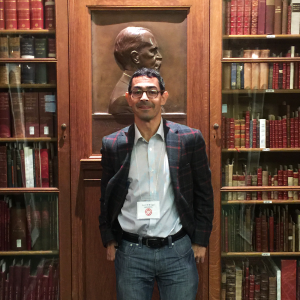Takeaway
Role models can be found on Netflix. Jiro, the master sushi chef, is aiming for perfection, and we must also continuously try to get better in our work with patients.

Lifelong learning in clinical excellence | April 21, 2020 | 2 min read
By Scott Wright, MD, Johns Hopkins Medicine
The COVID-19 pandemic has forced sequestration, and many are escaping to Netflix for a temporary reprieve from the news. I watched the documentary “Jiro Dreams of Sushi” the other day, and it prompted me to reflect on the pursuit of mastery and lifelong learning in clinical excellence.
Be passionate
If you love what you’re doing, it won’t feel like work. Even if some aspects of the endeavor don’t always feel fun, focus on appreciating the effort and learning that goes into mastering the task. Success often comes slowly after much practice—10,000 hours according to the deliberate practice theory—and can’t be rushed. With passion, Jiro shows that if you commit for the long haul, persevere in the face of challenges, and remain focused on specific goals, you can find peace with the outcomes.
Surround yourself with great people
At Jiro’s restaurant, some employees only lasted one day. Those who stay on the team are dedicated to making unparalleled sushi so that customers are fully satisfied. Working on a highly functioning team requires sacrifice and it means that you often need to put the needs of others ahead of your own.
Using the fish metaphor, not even Jiro can make great sushi from low quality tuna (ahi). Working with terrific people is critical to finding happiness at work and being successful; this idea was emphasized in Jim Collins’ book “Good to Great”, where he explained the necessity of having ONLY the “right people” on the bus. “Right” was defined as those truly committed to excellence.
Teach and mentor those coming behind you
I’ve studied role models in medicine for a long time, and find Jiro to be a terrific role model in many ways. While watching the documentary, take note of three things that Jiro does that you appreciate or admire and try doing them over the next week. In addition to Jiro’s two sons, it’s clear he cares about his mentees, that he loves them, and that he wants them to flourish, even though he may be strict or judgmental at times.
Aim to do even better tomorrow
Jiro is 85, his restaurant has three Michelin stars, and it’s in a subway station—you can achieve and inspire excellence irrespective of setting or location. Amazingly, despite being at the pinnacle of his field, Jiro dreams about making his sushi even better. Setting goals to raise your own standards and to achieve the best that you can is reasonable for both a sushi chef and a healthcare professional.
Trial and error are necessary and rebounding after failures is critical.
The lack of diversity on Jiro’s team bothered me
The only part of the documentary that bothered me was the absence of diversity. Jiro is the stereotypical master sushi chef—an old man. The Washington Post reports that unfortunately there’s “… an age-old notion that [women] can’t make sushi.” The secrets of sushi-making are always handed down from father to son. There’s even the old myth that, “…because of the menstrual cycle, women have an imbalance in their taste, and that’s why women can’t be sushi chefs.” Women are now working to break into the traditionally male-dominated field.
If you can recommend sushi restaurants that have female chefs making the sushi, I will preferentially support those businesses (as soon as we’re allowed to go to restaurants again).

